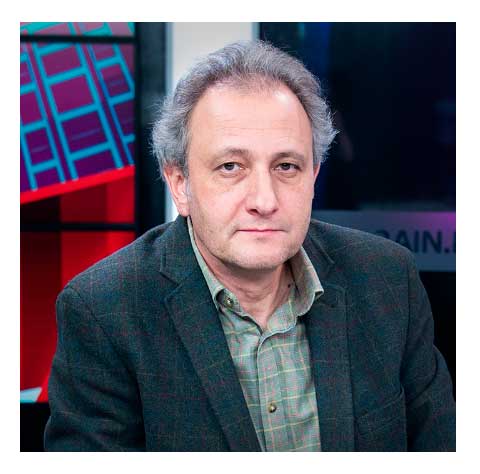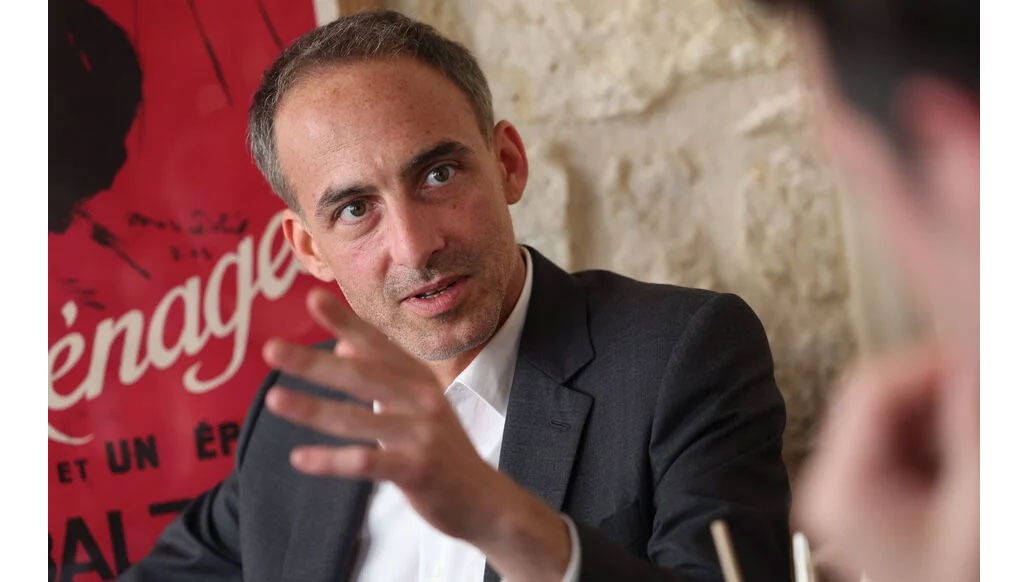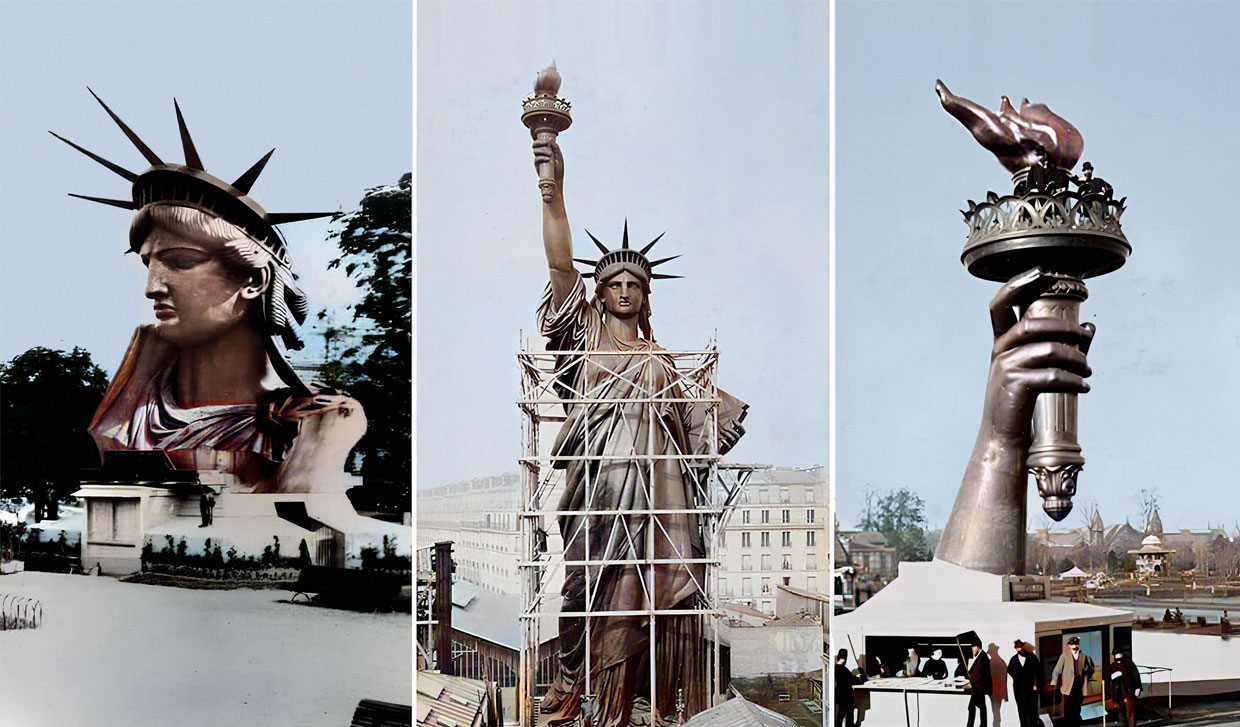 French politician Raphaël Glucksmann, son of one of the intellectual leaders of Paris May 1968 André Glucksmann, suggested to Americans, in view of the changing policies of the US administration, to return the Statue of Liberty to France, created by Auguste Bartholdi and presented to the United States in honor of the centennial of the American Declaration of Independence. Glucksmann proposed to accept American scientists in France who lost their jobs in the US due to the refusal to fund many projects and organizations. White House Press Secretary Caroline Levitt, responding to the French politician of "low rank," noted that only thanks to America "the French do not speak German today". Such an identification of the Trump and Franklin Roosevelt administrations, very similar to Putin equating his special military operation to the Great Patriotic War...
French politician Raphaël Glucksmann, son of one of the intellectual leaders of Paris May 1968 André Glucksmann, suggested to Americans, in view of the changing policies of the US administration, to return the Statue of Liberty to France, created by Auguste Bartholdi and presented to the United States in honor of the centennial of the American Declaration of Independence. Glucksmann proposed to accept American scientists in France who lost their jobs in the US due to the refusal to fund many projects and organizations. White House Press Secretary Caroline Levitt, responding to the French politician of "low rank," noted that only thanks to America "the French do not speak German today". Such an identification of the Trump and Franklin Roosevelt administrations, very similar to Putin equating his special military operation to the Great Patriotic War...
It is understandable that Raphaël Glucksmann wants to be noticed, but he is a very smart person, once edited a very good intellectual magazine Nouveau Magazine Litteraire, and his PR-provocation hit a sore spot — today's United States is losing the monopoly, if not the very right, to represent the idea of freedom. However, once Glucksmann's father said that one should not confuse the people of Russia with Putin, and here too — it is hardly worth identifying the US and its democratic system with Trump. But Glucksmann Jr.'s idea is clear — France is ready to take up the banner of liberalism and democracy, relying on its traditions. Eugène Delacroix, "Liberty Leading the People" — all this should be revived.
How low Glucksmann's political "rank" is, is also a question. Once Emmanuel Macron also had no high rank, and he broke through to the very top of the political hierarchy of France precisely because he presented the project of a certain third force. And in the conditions of functioning democratic institutions, such a person, it turns out, can become the president of the country.

Raphaël Glucksmann
What to do — democracy elevated Trump to the top, and it has already once brought him down from the pedestal. It is still too early to discard the safety net of Western democratic institutions. And therefore, the old world order, possibly doomed, still resists the forces of the new world disorder, which are embodied by strong men, stable autocrats — Putin, Trump, Lukashenko, Erdogan, Maduro, and many others.
The weakness of Europe seems to have become a common place in today's embittered discussions and lightweight statements. And a weak Europe, a daring Putin's Russia, a self-sufficient China, and Trumpizing USA create the impression of a world disorder in making, in the process of formation. Moreover, this is precisely disorder, far from a new world order, which, if it is indeed coming, is to replace the world order established in 1945 and turned into a temporary "end of history" in 1989, is still far away.
Nevertheless, a united Europe turned out to be the most successful and attractive project in history, ensuring a high level of well-being, consensus on fundamental values, and the absence of wars. Yes, the end of the "end of history" called into question the effectiveness of the project, but other, more impressive successes, except perhaps for the construction of democracy and the market in the USA, humanity is not able to present. The West as a whole and Europe in particular have already "sunset" many times, and in the most tragic way, but sooner or later the pendulum of history moved in the opposite direction, and a new dawn began — without the guarantee of a new sunset.
The current eroding globalization is also not the first. Before the tragedy of August 1914, it also seemed that a period of universal reconciliation and consensus on basic values, progress, and hygienic revolution was coming. Who did not write about this blissful state — from British historian Eric Hobsbawm to Stefan Zweig in his tragic last book "The World of Yesterday": "In such relapses of barbarism, as wars between the peoples of Europe, they believed as little as in witches and ghosts". And yet: the First World War broke out — for, it seemed, a local reason — after a short pause, filled with the maturation of totalitarian systems, it spilled over into the Second World War.
Thus ended the first globalization, the first "end of history". Signs of erosion of the second globalization found their spectacular expression in the 9/11 catastrophe, and then in the right-populist wave, the emergence of the phenomena of Putin and Trump.
The paradox is that modernization, equal to Westernization, the Western world order, claiming universality, broke precisely due to its attractiveness and soft power.
Immigrants fled from troubles and catastrophes not to other countries of the "global South", but precisely to the USA and European states. Demographically it was (and remains) inevitable, including due to the imbalance of birth rates and living standards in the North and South, which the outstanding Russian demographer Anatoly Vishnevsky persistently drew attention to many years ago. Migrants, a demographic, social, economic phenomenon, turned into a political factor within the Western world. Into a subject of speculation and one of the reasons for the political success of the far-right.
At the same time, the emphasis on human and citizen rights and freedoms in places degenerated into political correctness and wokism, which also gradually gained significance as a political factor and pushed the spread in the Western world of a simple and accessible understanding of ultra-right ideology. And Putin's ideologists and he himself began to say that they are the guardians of truly Western conservative values, undermined by "destructive liberal ideology".
The emergence and development of the Western crisis was also facilitated by general relaxation: everything was going well, it seemed, by itself, especially in the 1990s. The European Union and NATO expanded on a voluntary basis, becoming institutional anchors and signs of a new identity for former communist countries and republics of the USSR. But absolute impeccability does not exist, as well as universally recognized success — the seeds of resentment and nationalism bore their fruits, which in Europe were treated carelessly. Europe relaxed. Some insightful thinkers warned about this risk too. By the way, first of all, not fully read Francis Fukuyama. Or Merab Mamardashvili, who in 1988 gave a report in Paris "European Responsibility", calling on Europe not to forget that maintaining democracy is daily efforts. Otherwise, institutional muscles atrophy and society finds itself at risk of slipping into authoritarianism.
Relaxation and prosperity naturally led to a leadership crisis. Churchill, Roosevelt, de Gaulle, Adenauer, in later times, for example, Reagan and Thatcher — these are all leaders of permanent struggle. When there is no need to fight, leaders of a completely different type arise, corresponding to an era of tranquility.
The leadership gaps were filled not by new Churchills (except that Vladimir Zelensky was honored with such comparisons), but by leaders of an authoritarian, anti-democratic type — Trump, Putin, Chairman Xi, Erdogan, for whom power itself, preferably unlimited, is the main symbol of faith. And universal values in their understanding are "rules" established by no one knows who. Rules, by the way, often recorded in their own national Constitutions, not to mention acts of international law.
Starmer, Macron, Scholz, Merz, Meloni, a pleiad of Euro-bureaucrats — they do not resemble politicians of those times when "leaders were great" or when state leaders laid the foundations first of market unity, and then of states on the European continent. It is objectively difficult to deal with new strong men, and here is also the second wave of growing popularity of right-wing populists, ongoing migration, the threat of Islamic radicalism, resurgent anti-Semitism...

That's why statements by politicians of "low rank" become an event. That's why Emmanuel Macron begins to appeal to the legacy of de Gaulle, a model of an independent, positively politically aggressive, in some ways even anti-American France. Awakening (neo)Gaullism with already existing formally Gaullist, but long exhausted right-center parties, the only political pedal Macron can press with all his might. Not only for himself and France, which is swaying, judging by the summer 2024 elections, from the far-right flank to the far-left, but also for Europe and its independent role. He has no other historical legacy to overcome the crisis of French and European identity, except for the symbolic figure of Charles de Gaulle.
Interestingly, the skirmish between Glucksmann Jr. and the young press secretary, imitating the big boss, parodically resembles the remote squabble between Roosevelt's Secretary of State Cordell Hull and de Gaulle himself, at that time, in late 1941, leading the incomprehensible "Free France". Then Hull called de Gaulle's militarized structure, an alternative to the Pétain government, "the so-called 'Free France'", and the French leader called Hull "the so-called Secretary of State". But contacts and cooperation were still established in the face of a common enemy. Even despite the fact that Roosevelt and de Gaulle could not stand each other.
Now, it seems, there is no understanding of the image of a common enemy among the leaders of the Euro-Atlantic world, this is the problem, new and without an immediate solution. Unless Europe substantively and confidently participates in establishing peace in Ukraine. More precisely, in fixing the losses of the world order accumulated as a result of three years of hostilities in the east of the European continent. Losses of the slaughter, as a result of which there can be no winners and — at least at this stage — a just peace. A situation where war and peace mix in one bottle of a new cold war, becoming a continuation of hot confrontation by other means.
De Gaulle in this crisis situation would definitely not be superfluous. Although he also suffered defeats, and very painful ones, failing to cope with changes in the same world order. As it was, for example, in 1968.
And let the Statue of Liberty remain in its former place. And continue by its very existence and geographical position to maintain hope that the old world order will once again adapt to new challenges and survive this too.
* The Ministry of Justice of the Russian Federation considers Andrey Kolesnikov a "foreign agent".